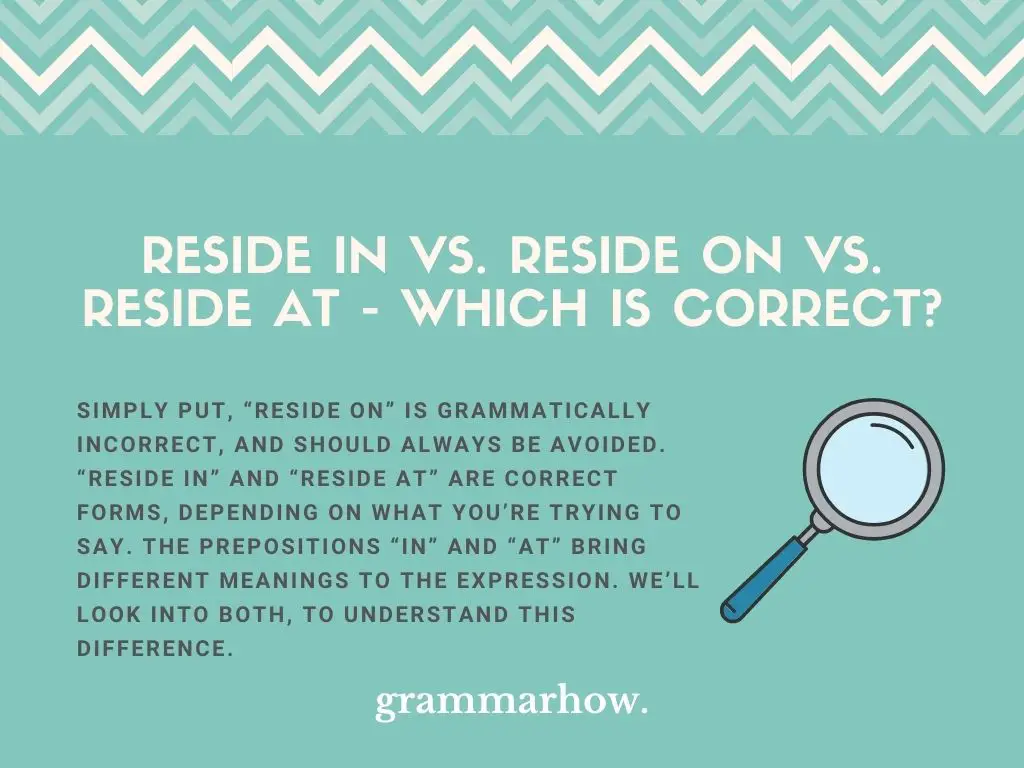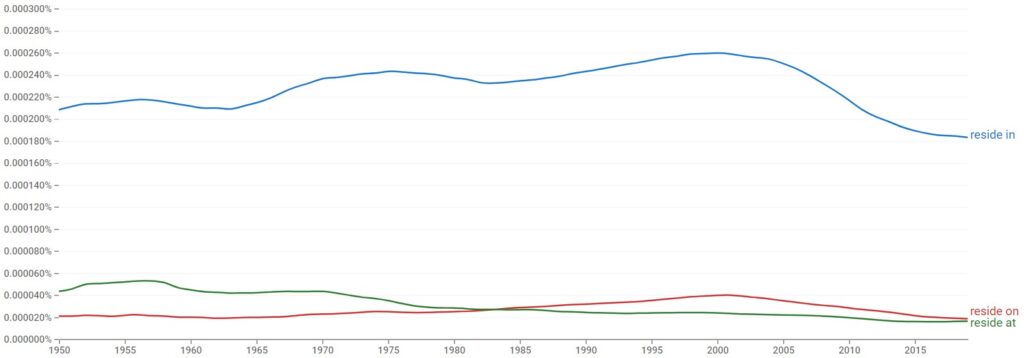Choosing the correct preposition to complement your speech can be difficult. Sometimes, they sound similar, but don’t deliver the same meaning, do they?
Let’s take a look at “Reside In”, “Reside On”, and “Reside At”, and find out which is correct and how they should be used.
Reside In vs. Reside On vs. Reside At – Which Is Correct?
Simply put, “Reside On” is grammatically incorrect, and should always be avoided. “Reside In” and “Reside At” are correct forms, depending on what you’re trying to say. The prepositions “In” and “At” bring different meanings to the expression. We’ll look into both, to understand this difference.

Let’s start with some examples:
- Tessa resides at 100, Raleigh St.
- Antonio resides in the United States.
- Peter resides on New York. (incorrect)
First of all, you should keep in mind that the verb “to reside” usually indicates an individual’s residence, the place where they live. It’s a word with a very specific meaning, and very difficult to use figuratively.
Reside In
“Reside In” is a grammatically correct form. It should be used when you’re referring to a space. It could be a vehicle, water, neighborhood, city, country, etc. As long as you’re pointing out a general area, “Reside In” will fit in perfectly.
“Reside In” is used as you can see in the sentences below:
- She resides in Louisiana.
- Link was residing in his car for a while last year.
- That cat resides in Lianne’s home.
- I wish I could reside in Seattle.
- Savannah resides now in Australia.
- Pete and Lisa decided to reside in their motorhome, while traveling the country.
When looking at those examples, note two different things. First, the meaning is that the expression “Reside In” relates always to a place where people (or animals, like Lianne’s cat) live.
Second, we’re just indicating a space, a general area – such as a city, a car, a country, for example. In those instances, “Reside In” makes sense and fits perfectly (although some might consider the verb “to reside” obsolete).
Reside On
“Reside On” is grammatically incorrect, and should be avoided. The preposition “On” indicates flat surfaces, big or small. It doesn’t relate to where people reside, and consequently it doesn’t work well to try to use the form “Reside On”.
Let’s see examples of how not to use “Reside On” in a sentence, as well as some correct uses of “On”:
- The house I reside in lays on 5 acres of land.
- The book is on the table.
- Bob resides on that apartment building. (incorrect)
- Savannah resides now on Australia. (incorrect)
- The cat resides on Lianna’s home. (incorrect)
The first sentence is my favorite, because it contains both examples we’re looking for. It starts with “the house I reside in” (which is correct, because I’m indicating a general area, where I live).
It continues with telling it “lays on 5 acres of land”. Land is considered fairly flat, and that’s why we can use “lay on” attached to it. The preposition “on” correctly follows the verb “to lay”, in this case.
Every time we try to use “Reside On” to indicate the place where a person lives, the sentence just becomes incorrect. You should never use it for that purpose.
Reside At
“Reside At” is a grammatically correct form, just like “Reside In”. The preposition “At” indicates a specific location. When pointing to the specific location a person “Resides At”, this form makes sense and should be used.
Here are some examples of “Reside At” in a sentence:
- Joe resides at the yellow house down the road.
- Gabriel still resides at his parents’ vacation house.
- I reside at 20, Blossom St.
- You shouldn’t reside at the Isles Community anymore, it’s dangerous.
- Do you reside at your office now? I never see you at home.
Look closely at the examples. Note that each sentence points to a specific location that is unique: the yellow house, someone’s vacation home or a community with a name aren’t general areas or places.
The sentences in the examples provide very specific information as to where the individual resides.
Whenever addressing a specific place, with an address or details that distinguish it from all general areas around, “Reside At” is the form you should choose to use.
Which Is Used the Most?
When talking about someone’s residence, which of the three forms do people use more? Take a look at the graph from Google Ngram Viewer below, to see if people use more “Reside In”, “Reside On” or “Reside At”.

The graph clearly shows that “Reside In” is much more common. People use it with more frequency. It was to be expected, since this form refers to general locations, and has a broader usage. It didn’t surprise us to see it popping up more than the others.
“Reside On” and “Reside At” appear much less frequently. For “Reside On”, we think it’s because this is grammatically wrong form – so it may appear here and there, but definitely not too frequently. This is so, because it’s simply wrong.
As for “Reside At”, this form has a very specific use, to indicate a very specific location. The more specific an expression is, the less likely it is to pop up in sentences. That’s why we can see “Reside At” not being used as frequently as “Reside In”.
Final Thoughts
When using the verb “to reside”, think about how specific the location you’re indicating is, when choosing the form you’ll use. Never use “Reside On”. Use “Reside In” when pointing to a general location (like a city, for example). And use “Reside At” when indicating a specific, exact location.
